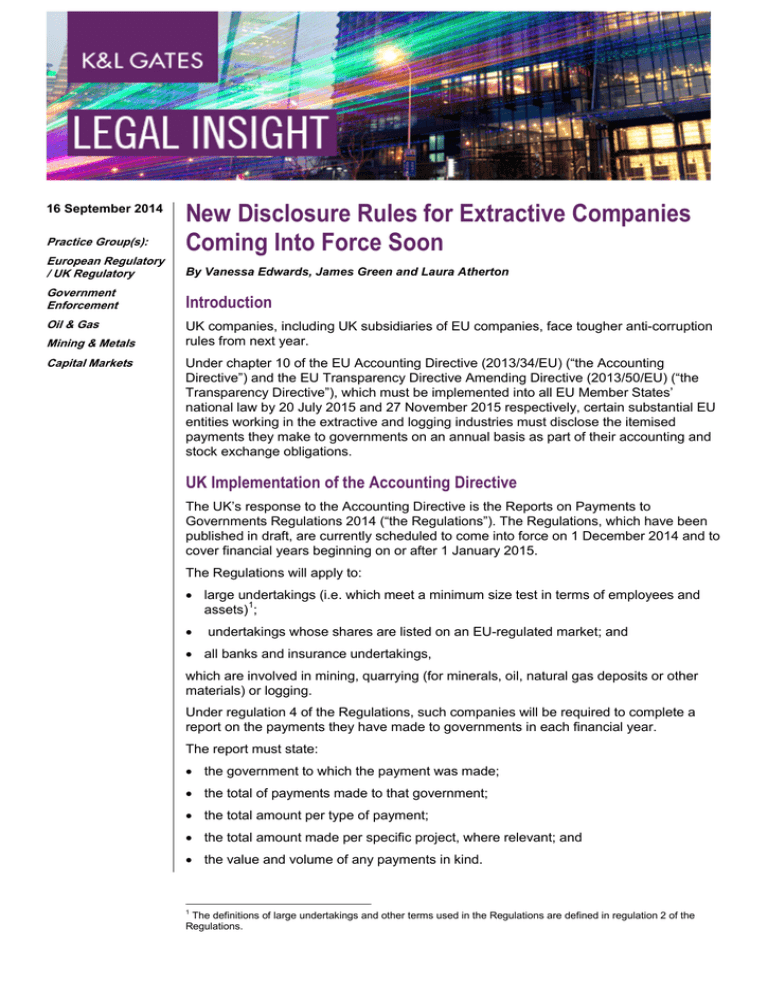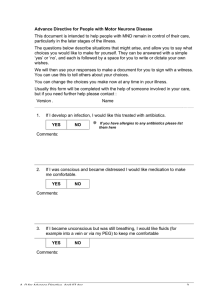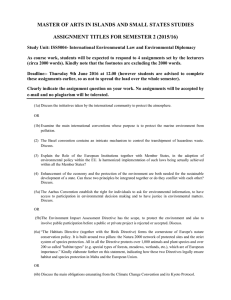New Disclosure Rules for Extractive Companies Coming Into Force Soon Introduction
advertisement

16 September 2014 Practice Group(s): European Regulatory / UK Regulatory New Disclosure Rules for Extractive Companies Coming Into Force Soon By Vanessa Edwards, James Green and Laura Atherton Government Enforcement Introduction Oil & Gas UK companies, including UK subsidiaries of EU companies, face tougher anti-corruption rules from next year. Mining & Metals Capital Markets Under chapter 10 of the EU Accounting Directive (2013/34/EU) (“the Accounting Directive”) and the EU Transparency Directive Amending Directive (2013/50/EU) (“the Transparency Directive”), which must be implemented into all EU Member States’ national law by 20 July 2015 and 27 November 2015 respectively, certain substantial EU entities working in the extractive and logging industries must disclose the itemised payments they make to governments on an annual basis as part of their accounting and stock exchange obligations. UK Implementation of the Accounting Directive The UK’s response to the Accounting Directive is the Reports on Payments to Governments Regulations 2014 (“the Regulations”). The Regulations, which have been published in draft, are currently scheduled to come into force on 1 December 2014 and to cover financial years beginning on or after 1 January 2015. The Regulations will apply to: • large undertakings (i.e. which meet a minimum size test in terms of employees and assets)1; • undertakings whose shares are listed on an EU-regulated market; and • all banks and insurance undertakings, which are involved in mining, quarrying (for minerals, oil, natural gas deposits or other materials) or logging. Under regulation 4 of the Regulations, such companies will be required to complete a report on the payments they have made to governments in each financial year. The report must state: • the government to which the payment was made; • the total of payments made to that government; • the total amount per type of payment; • the total amount made per specific project, where relevant; and • the value and volume of any payments in kind. 1 The definitions of large undertakings and other terms used in the Regulations are defined in regulation 2 of the Regulations. New Disclosure Rules for Extractive Companies Coming Into Force Soon Moreover, a parent company with a subsidiary to which the Regulations apply (even if the Regulations do not apply to the parent company itself) is in certain circumstances required to prepare a consolidated report containing the above information. There is a de minimis value of £86,000 per payment or series of related payments below which reporting is not required. Companies required to make this report will be allowed a maximum of 11 months after the end of the financial year to file the report at Companies House. Such reports will remain publicly available for at least 10 years. There are permitted exemptions from reporting in certain circumstances 2, including where the report is made elsewhere by consolidated report of the parent company. Making misleading, false or deceptive reports will be an offence under section 1112 of the Companies Act 2006 for which both the company and the individuals involved may be convicted. The offence is punishable by unlimited fines and, in addition, imprisonment for individuals. It is not certain at this stage whether a late filing penalty regime along the lines of that applied to accounts will apply to reports made pursuant to the Regulations. UK Implementation of the Transparency Directive This Directive will apply to companies that are active in the extractive or logging industries whose shares are listed on an EU-regulated market. The UK has made less progress, to date, in relation to implementation of the Transparency Directive into national law and now the UK Financial Conduct Authority (“FCA”) has been asked by HM Treasury to align the implementation of the requirements of this Directive with the implementation of the reporting requirements in the Accounting Directive. The FCA has therefore produced a draft Disclosure and Transparency Rules (Reports on Payments to Governments) Instrument 2014 which it proposes to use to amend Chapter 4 of the Disclosure Rules and Transparency Rules (“DTR”) 3 in order to implement these Transparency Directive requirements, together with a consultation paper on this proposal. In essence, the proposals would require companies to which the Transparency Directive applies to make the new country-by-country reports on payments to governments in the same manner as any other regulated information required to be reported under the existing Transparency Directive, namely by annual report made within six months of the end of each financial year. The amendments to the DTR would apply to companies in logging and extractive industries which are required to comply with the DTR. Companies that fall within the scope of both directives will be required to make two separate filings of their reports on payments to governments to meet the obligations of each Directive. It is proposed that the existing sanctions regime for the DTR will apply, unamended, until the Transparency Directive is implemented in full across the EU in November 2015. The Government has opened a consultation on these proposals. The deadline for responding is 7 October 2014 and the consultation paper may be accessed here. 2 See regulations 6 and 7 of the Regulation. The DTR are a set of rules enforced by the FCA which implement various European Directives. These rules apply to issuers admitted to trading on a EU-regulated market where the UK acts as home Member State. 3 2 New Disclosure Rules for Extractive Companies Coming Into Force Soon What should clients do? Clients should be thinking now about auditing their payments to governments to ensure that they are ready to meet the reporting requirements and that they are in compliance with all relevant laws. Changes in procedures may be needed in order to collect, process and report the new data required. Individual employees and the company may expose themselves to criminal penalties for failure to comply. Consideration should also be given to payments and things of value given to entities and individuals closely connected to foreign governments (i.e. foreign government officials and their families, or companies owned by such individuals). These gifts or payments could create problems if it appears to the UK authorities that there is any attempt in their giving to mislead or deceive the authorities about the size, type and nature of the payments being made, the ultimate intended recipients or the reason why they are being made. Companies need to have systems and controls in place to ensure that no inappropriate payments or payments that need to be reported under the Regulations are made without prior consideration of the consequences for disclosure. Authors: Vanessa C. Edwards vanessa.edwards@klgates.com +44.(0)20.7360.8293 James O. Green james.green@klgates.com +44.(0)20.7360.8105 Laura Atherton laura.atherton@klgates.com +44.(0)20.7360.8322 Anchorage Austin Beijing Berlin Boston Brisbane Brussels Charleston Charlotte Chicago Dallas Doha Dubai Fort Worth Frankfurt Harrisburg Hong Kong Houston London Los Angeles Melbourne Miami Milan Moscow Newark New York Orange County Palo Alto Paris Perth Pittsburgh Portland Raleigh Research Triangle Park San Francisco São Paulo Seattle Seoul Shanghai Singapore Spokane Sydney Taipei Tokyo Warsaw Washington, D.C. Wilmington K&L Gates comprises more than 2,000 lawyers globally who practice in fully integrated offices located on five continents. The firm represents leading multinational corporations, growth and middle-market companies, capital markets participants and entrepreneurs in every major industry group as well as public sector entities, educational institutions, philanthropic organizations and individuals. For more information about K&L Gates or its locations, practices and registrations, visit www.klgates.com. This publication is for informational purposes and does not contain or convey legal advice. The information herein should not be used or relied upon in regard to any particular facts or circumstances without first consulting a lawyer. © 2014 K&L Gates LLP. All Rights Reserved. 3

